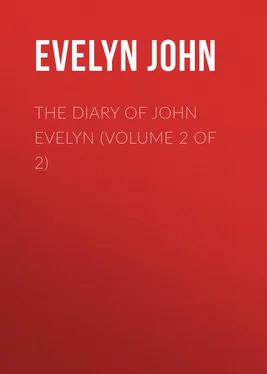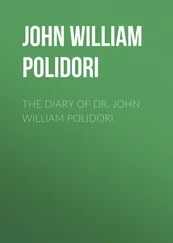John Evelyn - The Diary of John Evelyn (Volume 2 of 2)
Здесь есть возможность читать онлайн «John Evelyn - The Diary of John Evelyn (Volume 2 of 2)» — ознакомительный отрывок электронной книги совершенно бесплатно, а после прочтения отрывка купить полную версию. В некоторых случаях можно слушать аудио, скачать через торрент в формате fb2 и присутствует краткое содержание. Жанр: История, foreign_antique, foreign_prose, на английском языке. Описание произведения, (предисловие) а так же отзывы посетителей доступны на портале библиотеки ЛибКат.
- Название:The Diary of John Evelyn (Volume 2 of 2)
- Автор:
- Жанр:
- Год:неизвестен
- ISBN:нет данных
- Рейтинг книги:5 / 5. Голосов: 1
-
Избранное:Добавить в избранное
- Отзывы:
-
Ваша оценка:
- 100
- 1
- 2
- 3
- 4
- 5
The Diary of John Evelyn (Volume 2 of 2): краткое содержание, описание и аннотация
Предлагаем к чтению аннотацию, описание, краткое содержание или предисловие (зависит от того, что написал сам автор книги «The Diary of John Evelyn (Volume 2 of 2)»). Если вы не нашли необходимую информацию о книге — напишите в комментариях, мы постараемся отыскать её.
The Diary of John Evelyn (Volume 2 of 2) — читать онлайн ознакомительный отрывок
Ниже представлен текст книги, разбитый по страницам. Система сохранения места последней прочитанной страницы, позволяет с удобством читать онлайн бесплатно книгу «The Diary of John Evelyn (Volume 2 of 2)», без необходимости каждый раз заново искать на чём Вы остановились. Поставьте закладку, и сможете в любой момент перейти на страницу, на которой закончили чтение.
Интервал:
Закладка:
26th August, 1666. The contagion still continuing, we had the Church service at home.
27th August, 1666. I went to St. Paul's church, where, with Dr. Wren, Mr. Pratt, Mr. May, Mr. Thomas Chicheley, Mr. Slingsby, the Bishop of London, the Dean of St. Paul's, and several expert workmen, we went about to survey the general decays of that ancient and venerable church, and to set down in writing the particulars of what was fit to be done, with the charge thereof, giving our opinion from article to article. Finding the main building to recede outward it was the opinion of Chicheley and Mr. Pratt that it had been so built ab origine for an effect in perspective, in regard of the height; but I was, with Dr. Wren, quite of another judgment, and so we entered it; we plumbed the uprights in several places. When we came to the steeple, it was deliberated whether it were not well enough to repair it only on its old foundation, with reservation to the four pillars; this Mr. Chicheley and Mr. Pratt were also for, but we totally rejected it, and persisted that it required a new foundation, not only in regard of the necessity, but for that the shape of what stood was very mean, and we had a mind to build it with a noble cupola, a form of church-building not as yet known in England, but of wonderful grace. For this purpose, we offered to bring in a plan and estimate, which after much contest, was at last assented to, and that we should nominate a committee of able workmen to examine the present foundation. This concluded, we drew all up in writing, and so went with my Lord Bishop to the Dean's.
28th August, 1666. Sat at the Star-chamber. Next day, to the Royal Society, where one Mercator, an excellent mathematician, produced his rare clock and new motion to perform the equations, and Mr. Rooke, his new pendulum.
LONDON2d September, 1666. This fatal night, about ten, began the deplorable fire, near Fish street, in London.
3d September, 1666. I had public prayers at home. The fire continuing, after dinner, I took coach with my wife and son, and went to the Bankside in Southwark, where we beheld that dismal spectacle, the whole city in dreadful flames near the waterside; all the houses from the Bridge, all Thames street, and upward toward Cheapside, down to the Three Cranes, were now consumed; and so returned, exceedingly astonished what would become of the rest.
The fire having continued all this night (if I may call that night which was light as day for ten miles round about, after a dreadful manner), when conspiring with a fierce eastern wind in a very dry season, I went on foot to the same place; and saw the whole south part of the city burning from Cheapside to the Thames, and all along Cornhill (for it likewise kindled back against the wind as well as forward), Tower street, Fenchurch street, Gracious street, and so along to Baynard's Castle, and was now taking hold of St. Paul's church, to which the scaffolds contributed exceedingly. The conflagration was so universal, and the people so astonished, that, from the beginning, I know not by what despondency, or fate, they hardly stirred to quench it; so that there was nothing heard, or seen, but crying out and lamentation, running about like distracted creatures, without at all attempting to save even their goods; such a strange consternation there was upon them, so as it burned both in breadth and length, the churches, public halls, Exchange, hospitals, monuments, and ornaments; leaping after a prodigious manner, from house to house, and street to street, at great distances one from the other. For the heat, with a long set of fair and warm weather, had even ignited the air, and prepared the materials to conceive the fire, which devoured, after an incredible manner, houses, furniture, and every thing. Here, we saw the Thames covered with goods floating, all the barges and boats laden with what some had time and courage to save, as, on the other side, the carts, etc., carrying out to the fields, which for many miles were strewn with movables of all sorts, and tents erecting to shelter both people and what goods they could get away. Oh, the miserable and calamitous spectacle! such as haply the world had not seen since the foundation of it, nor can be outdone till the universal conflagration thereof. All the sky was of a fiery aspect, like the top of a burning oven, and the light seen above forty miles round about for many nights. God grant mine eyes may never behold the like, who now saw above 10,000 houses all in one flame! The noise and cracking and thunder of the impetuous flames, the shrieking of women and children, the hurry of people, the fall of towers, houses, and churches, was like a hideous storm; and the air all about so hot and inflamed, that at the last one was not able to approach it, so that they were forced to stand still, and let the flames burn on, which they did, for near two miles in length and one in breadth. The clouds also of smoke were dismal, and reached, upon computation, near fifty miles in length. Thus, I left it this afternoon burning, a resemblance of Sodom, or the last day. It forcibly called to my mind that passage – " non enim hic habemus stabilem civitatem "; the ruins resembling the picture of Troy. London was, but is no more! Thus, I returned.
4th September, 1666. The burning still rages, and it is now gotten as far as the Inner Temple. All Fleet street, the Old Bailey, Ludgate hill, Warwick lane, Newgate, Paul's chain, Watling street, now flaming, and most of it reduced to ashes; the stones of Paul's flew like grenados, the melting lead running down the streets in a stream, and the very pavements glowing with fiery redness, so as no horse, nor man, was able to tread on them, and the demolition had stopped all the passages, so that no help could be applied. The eastern wind still more impetuously driving the flames forward. Nothing but the Almighty power of God was able to stop them; for vain was the help of man.
5th September, 1666. It crossed toward Whitehall; but oh! the confusion there was then at that Court! It pleased his Majesty to command me, among the rest, to look after the quenching of Fetter-lane end, to preserve (if possible) that part of Holborn, while the rest of the gentlemen took their several posts, some at one part, and some at another (for now they began to bestir themselves, and not till now, who hitherto had stood as men intoxicated, with their hands across), and began to consider that nothing was likely to put a stop but the blowing up of so many houses as might make a wider gap than any had yet been made by the ordinary method of pulling them down with engines. This some stout seamen proposed early enough to have saved near the whole city, but this some tenacious and avaricious men, aldermen, etc., would not permit, because their houses must have been of the first. It was, therefore, now commended to be practiced; and my concern being particularly for the Hospital of St. Bartholomew, near Smithfield, where I had many wounded and sick men, made me the more diligent to promote it; nor was my care for the Savoy less. It now pleased God, by abating the wind, and by the industry of the people, when almost all was lost infusing a new spirit into them, that the fury of it began sensibly to abate about noon, so as it came no farther than the Temple westward, nor than the entrance of Smithfield, north: but continued all this day and night so impetuous toward Cripplegate and the Tower, as made us all despair. It also broke out again in the temple; but the courage of the multitude persisting, and many houses being blown up, such gaps and desolations were soon made, as, with the former three days' consumption, the back fire did not so vehemently urge upon the rest as formerly. There was yet no standing near the burning and glowing ruins by near a furlong's space.
The coal and wood wharfs, and magazines of oil, rosin, etc., did infinite mischief, so as the invective which a little before I had dedicated to his Majesty and published, 5 5 The Fumifugium .
giving warning what probably might be the issue of suffering those shops to be in the city was looked upon as a prophecy.
Интервал:
Закладка:
Похожие книги на «The Diary of John Evelyn (Volume 2 of 2)»
Представляем Вашему вниманию похожие книги на «The Diary of John Evelyn (Volume 2 of 2)» списком для выбора. Мы отобрали схожую по названию и смыслу литературу в надежде предоставить читателям больше вариантов отыскать новые, интересные, ещё непрочитанные произведения.
Обсуждение, отзывы о книге «The Diary of John Evelyn (Volume 2 of 2)» и просто собственные мнения читателей. Оставьте ваши комментарии, напишите, что Вы думаете о произведении, его смысле или главных героях. Укажите что конкретно понравилось, а что нет, и почему Вы так считаете.












